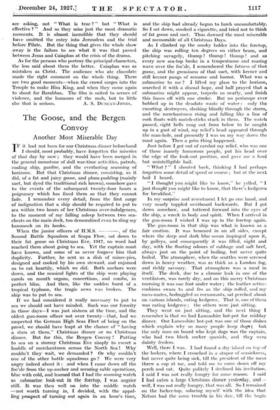"The King of Kings " T HERE is no sound argument against
the dramatic presentation of sacred scenes. But there is every argument against such a presentation as is to be seen in the film The King of Kings at Covent Garden. It is easy to see that it is all wrong during the first five minutes, and though there is more to be said for the second half, the later scenes never succeed in obliterating the early impression. It is easy to see why it is wrong, if comparison be made with the occasions when the life of Christ is presented with conviction and success.
At Oberammergau the performance holds an audience spellbound for the best part of a day. Even if you go expecting to be disappointed—as I did—you find yourself quickly absorbed by the sheer drama of the story from the outset, and the interest is so great that all sense of time falls away. What is the cause of this fascination ? First, undoubtedly, •that the Bavarians start from the facts. They have an excellent libretto, written by a Benedictine Father, built on the historical records, and making as much use of the Gospel story as possible. Then, having the facts, they see their meaning. Again, they are not strictly actors at all. They are men and women doing their work in the world as potters or carvers or what not, who regard the Passion Play as a great privilege, an opportunity to give their leisure to the presentation of sacred truth. Oberammergau has the advantage of a magnificent theatre. There are other villages in the Alps where Passionspiele are given without that advantage. There is, for example, Thiersee, near Kuistein, where an ingenuous performance is given in a glorified barn( There are almost mediaeval elements in the production, and funny little bits of "staginess." But its naïveté and sincerity grip even more perhaps than the great resources of Oberammergau. In both places the central aim is that which underlies all true art. The thing is done for its own sake—in other words, "To the Glory of God." A certain amount of money- getting may have crept in, but not sufficient to interfere with the profound conviction that the story is worth telling because it is true, and, being true, is supremely important.
At every point The King of Kings is a sharp contrast. It is not based on the facts. The film begins with a fantastic invention about Mary Magdalene "and Judas, which proclaims at once the mentality of Hollywood. When real facts are given, they are jumbled up anyhow. For example, the temptation is placed at the end, instead of at the beginning, of Christ's life. And it is impossible to extract any meaning from the story at all. Why this man aroused enthusiasm or was put to death never appears. The producers evidently have not the faintest idea of what it is all about. The secret of their failure is to be found in the emphasis laid on the programme on "reverence." The people at Oberammergau do not talk about reverence, because it never occurs to them to do so. Face to face with the greatest event in the history of the world, reverence happens. -- In truth The King of Kings is fundamentally irreverent, because those who produced it are thinking, not of their theme, but of their audience, and of the box-office. They are asking, not "What is true ? " but "What is effective ? " And so they miss just the most dramatic moments. It is almost . incredible that they should have omitted the entry into Jerusalem and the trial before Pilate. But the thing that gives the whole show away is the failure to see what it was that passed between Jesus and Caiaphas at the crisis of the drama.
As for the persons who portray the principal characters, the less said about them the better. Caiaphas was as mistaken as Christ. The audience who ate chocolate made the right comment on the whole thing. There are two good moments—when the crowd surges into the Temple to make Him King, and when they come again to shout for Barabbas. The film is suited to scenes of violence, and the humours of the mob, but to little































 Previous page
Previous page